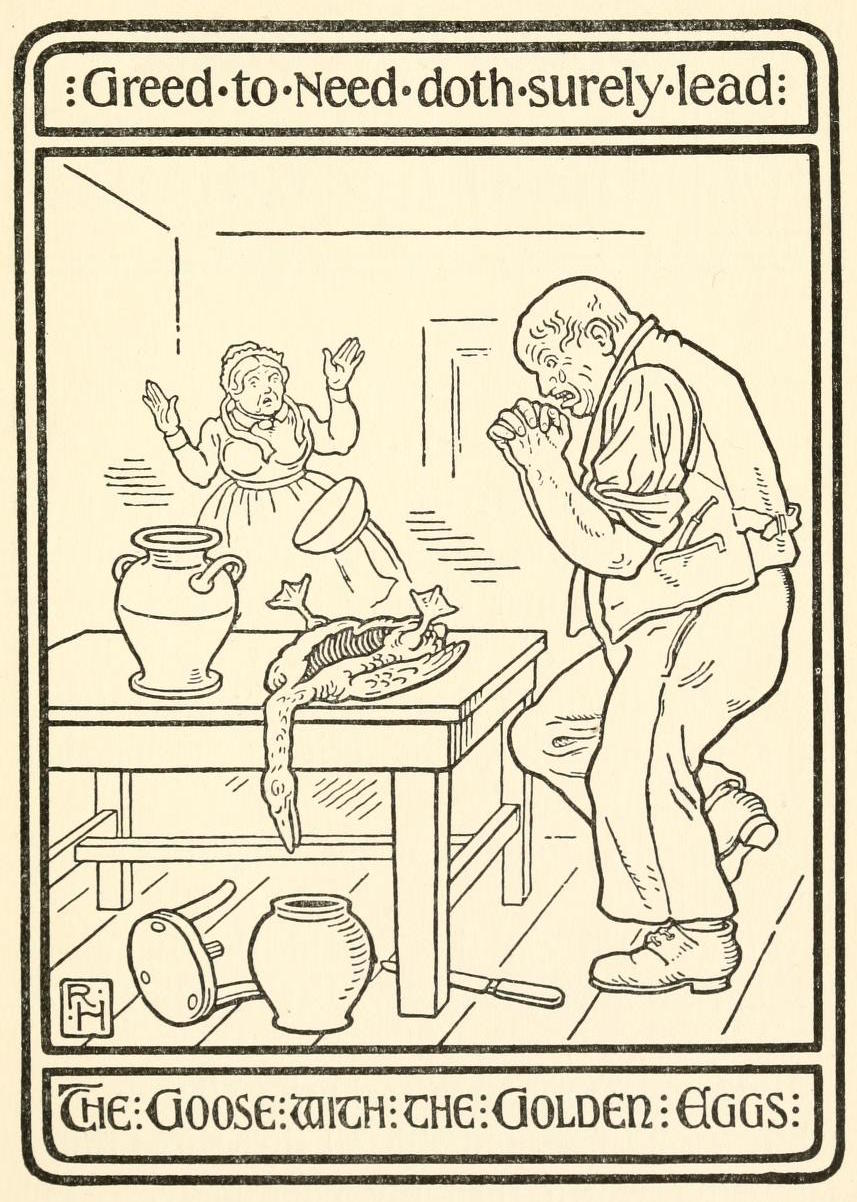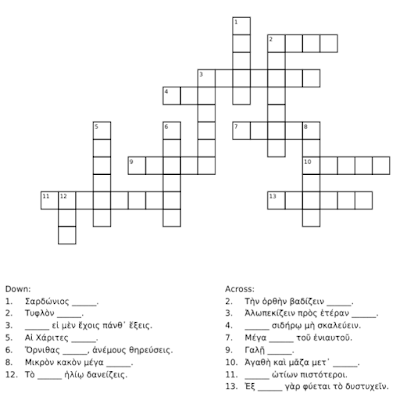Both the fable and the joke below come from Abbott's
Easy Greek Reader which is available at the Internet Archive.
So, here are the stories in Greek, then segmented, and then interwoven with English. The titles are linked to the Internet Archive page.
Λύκος δήποτε ἄρας ἀρνίον ἐκ ποίμνης ἀπεκόμιζεν εἰς τὴν ἰδίαν κοίτην· λέων δὲ τούτῳ ἐξαίφνης συναντήσας, ἦρεν ἐξ αὐτοῦ τὸ ἀρνίον. Στὰς δὲ πόῤῥωθεν πρὸς αὐτὸν ταῦτα λέγει· ἵνα τί, ἄναξ, ἐξ ἐμοῦ τοῦτο ἦρας; πῶς δὲ οὐ τηρεῖς τοὺς θεσμοὺς τοὺς ἀρχαίους, τοῦ μὴ τυραννεῖν χειρὶ δυνατωτάτῃ, ἀλλὰ πάντοτε ἐκδικεῖν τοῖς ἀπόροις; Ὁ δὲ γελάσας πρὸς αὐτὸν ταῦτα λέγει· σὺ δὲ, ὦ λύκε, δικαίως τοῦτʼ ἂν ἔσχες, εἴ τις τῶν φίλων αὐτὸ κεχάρικέ σοι.
Λύκος δήποτε
ἄρας ἀρνίον ἐκ ποίμνης
ἀπεκόμιζεν
εἰς τὴν ἰδίαν κοίτην·
λέων δὲ
τούτῳ ἐξαίφνης συναντήσας,
ἦρεν ἐξ αὐτοῦ τὸ ἀρνίον.
Στὰς δὲ πόῤῥωθεν
πρὸς αὐτὸν ταῦτα λέγει·
ἵνα τί, ἄναξ,
ἐξ ἐμοῦ τοῦτο ἦρας;
πῶς δὲ
οὐ τηρεῖς
τοὺς θεσμοὺς τοὺς ἀρχαίους,
τοῦ μὴ τυραννεῖν χειρὶ δυνατωτάτῃ,
ἀλλὰ πάντοτε
ἐκδικεῖν τοῖς ἀπόροις;
Ὁ δὲ γελάσας
πρὸς αὐτὸν ταῦτα λέγει·
σὺ δὲ, ὦ λύκε,
δικαίως τοῦτʼ ἂν ἔσχες,
εἴ τις τῶν φίλων
αὐτὸ κεχάρικέ σοι.
Λύκος δήποτε ... There was once a wolf
ἄρας ἀρνίον ... who seized a lamb
ἐκ ποίμνης ... from the flock,
ἀπεκόμιζεν ... and carried it away
εἰς τὴν ἰδίαν κοίτην ... to his lair.
λέων δὲ ἐξαίφνης ... All of a sudden, a lion
τούτῳ συναντήσας ... ran into him,
ἦρεν ἐξ αὐτοῦ τὸ ἀρνίον ... and took the lamb.
Στὰς δὲ πόῤῥωθεν ... Standing at a distance
πρὸς αὐτὸν ταῦτα λέγει ... the wolf said to him,
ἵνα τί, ἄναξ ... Why, my lord,
ἐξ ἐμοῦ τοῦτο ἦρας ... did you take that from me?
πῶς δὲ οὐ τηρεῖς ... How can you not heed
τοὺς θεσμοὺς τοὺς ἀρχαίους ... the ancient laws
τοῦ μὴ τυραννεῖν ... against ruling absolutely
χειρὶ δυνατωτάτῃ ... by the most powerful hand,
ἀλλὰ πάντοτε ... but rather always
ἐκδικεῖν τοῖς ἀπόροις ... showing justice to the helpless?
Ὁ δὲ γελάσας ... And the lion laughed
πρὸς αὐτὸν ταῦτα λέγει ... and said to him,
σὺ δὲ, ὦ λύκε ... And you, wolf:
τοῦτʼ ἂν ἔσχες ... I suppose you got the lamb
δικαίως ... lawfully,
εἴ τις τῶν φίλων ... some friend of yours
αὐτὸ κεχάρικέ σοι ... having given it to you as a gift.
Σχολαστικὸς συμφοιτητὰς ἐπὶ δεῖπνον καλέσας, ἐπαινεσάντων αὐτῶν ὑὸς κεφαλὴν καὶ ἀξιωσάντων καὶ τῇ ὑστεραίᾳ παρ’ αὐτῷ ἑστιαθῆναι, ἀπελθὼν πρὸς τὸν μάγειρον· Δός μοι, ἔφη, ἀπὸ τοῦ αὐτοῦ χοίρου κεφαλὴν ἑτέραν· ἡ γὰρ χθὲς ἡμῖν πάνυ ἤρεσεν.
Σχολαστικὸς
συμφοιτητὰς ἐπὶ δεῖπνον καλέσας,
ἐπαινεσάντων αὐτῶν
ὑὸς κεφαλὴν
καὶ ἀξιωσάντων
καὶ τῇ ὑστεραίᾳ
παρ’ αὐτῷ ἑστιαθῆναι,
ἀπελθὼν πρὸς τὸν μάγειρον·
Δός μοι, ἔφη,
ἀπὸ τοῦ αὐτοῦ χοίρου
κεφαλὴν ἑτέραν·
ἡ γὰρ χθὲς
ἡμῖν πάνυ ἤρεσεν.
Σχολαστικὸς
συμφοιτητὰς ἐπὶ δεῖπνον καλέσας,
ἐπαινεσάντων αὐτῶν
ὑὸς κεφαλὴν
καὶ ἀξιωσάντων
καὶ τῇ ὑστεραίᾳ
παρ’ αὐτῷ ἑστιαθῆναι,
ἀπελθὼν πρὸς τὸν μάγειρον·
Δός μοι, ἔφη,
ἀπὸ τοῦ αὐτοῦ χοίρου
κεφαλὴν ἑτέραν·
ἡ γὰρ χθὲς
ἡμῖν πάνυ ἤρεσεν.
Σχολαστικὸς ... A dunce
συμφοιτητὰς καλέσας ... invited his schoolfellows
ἐπὶ δεῖπνον ... to dinner.
ἐπαινεσάντων αὐτῶν ... When they praised
ὑὸς κεφαλὴν ... the pig's head,
καὶ ἀξιωσάντων ... and encouraged him
παρ’ αὐτῷ ἑστιαθῆναι ... to serve it at dinner
καὶ τῇ ὑστεραίᾳ ... again the next day.
ἀπελθὼν πρὸς τὸν μάγειρον ... He went to the butcher,
Δός μοι, ἔφη ... and said, "Give me
κεφαλὴν ἑτέραν ... another head
ἀπὸ τοῦ αὐτοῦ χοίρου ... from that same pig.
ἡμῖν πάνυ ἤρεσεν ... We really enjoyed
ἡ γὰρ χθὲς ... the one yesterday.
And here's a random proverb and a random LOLCat too:





















